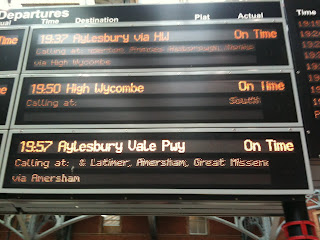
It’s a rare Chiltern Line regular who doesn’t dabble in a spot of Commuter Roulette now and again. It's all done very quietly and no money ever changes hands (that I know of) but that doesn't mean it's not happening. Believe me, it is. In between furiously typed emails and in the split second gaps when newspaper pages are turned a committed and growing number of homeward-bound passengers are sizing up their neighbors and making their calculations.
It’s a simple enough game to play; you merely look at the commuters around you and guess which stop they will get off at. There are myriad variations depending on which train you're on. For example, if you are on the 7:33 to Stratford-Upon-Avon and you live in Beaconsfield the extent of your game is to guess who is continuing onward and who is getting off at Beaconsfield, the train's first stop. On the other hand, if you are on the 8:06 milk run to Aylesbury you will experience the maximum challenge. I'm talking Wembley, Northolt Park, The Ruislips, Denham, Gerrards Cross, Beaconsfield and beyond. Only with the full compliment of stops can you properly test your skills of observation and intuition.
So, what are you looking for? What is it that indicates a person’s provenance? Well, age plays a role, as does time of travel, type of newspaper being read and type of electronic device being used. Depth of tan tells you something, as does accent, cut of suit, presence of cycling gear and degree of spatial courtesy shown to neighbors. All these seemingly innocuous little clues can, to the well-trained eye, be converted into raw data which can then be applied to your betting.
So, lets get started. The key focus when trying to spot someone likely to alight at the first few stops (Wembley, Northolt Park and Sudbury Hill and Harrow) is age, style/quality of clothing, proximity to the doors and quality of case. If you see a young man in a High Street leather jacket standing by the doors with a carrier bag he is not going farther north than the southern-most Ruislip...at best. Dead cert. Bet heavily.
Next up are the Ruislips themselves, South and West. Ruislippers are tough to nail and are, by and large, an instinct call. Haircut and footwear (neither any good) can provide guidance for a would-be Ruislip spotter, but the sharper eyes are focusing for what’s
not there. The jacket
not hanging on the little bolt on the back of the chair in front. The lack of food and drink in hand or cupholder. The absence of a three-inch thick Wallander novel. It is this sense of impermanence, this lack of even the most temporary signs of nesting that marks out the abbreviated journey of a Ruislipper.
Now it gets a bit tougher. Post-Ruislip we enter an area I call the Fairway, a continuous string of posh Golf Clubs around which have sprouted the towns of Denham, Gerrards Cross and Beaconsfield, with the tough-to-pin-down Seer Green and Jordons sandwiched in the middle.
For what it’s worth, I don’t really have a tip for SGJers. Like their town, I am at a loss to find anything interesting or remotely distinguishing about them and so usually just thumb my chips at this point.
As for the other three, as I say, it’s tough. By and large commuters from all these places look similar. My advice is something like a spread bet. Break the carriage down into three groups: Comfortable, Well-off and Loaded. Then put all you’re your money on the Well-offs bailing at Denham. Oh, and ignore anyone on board who looks uncannily similar to Ruislippers as you now know the remaining people on board with bad hair and bad shoes live in High Wycombe.
OK, all that’s left now (if, like me, you live in Beaconsfield), is separating the Gerrards Cross lot from the Beaconsfield crowd. Posh and Becs.
As rule GXers are a bit fatter, have deeper tans, wear a better quality (though more predictably cut) suit and are considerably louder than their Beaconsfield cousins. If you hear a South African accent, you are hearing a GXer. If you see slicked-back hair, you are seeing a GXer. Honestly, it’s not hard. If you feel a sort of inexplicable loathing…put your money down.
As for the Beaconsfield lot. Bromptons are a bit of a giveaway. Slightly younger, cooler professionals tend to get on and off here. As do, sadly, a lot of long-skirted women with a briefcases and trainers. There seem to be more oldies getting off here, too. It’s not the best-looking lot but (and I admit to being a bit biased) there is something reassuringly genuine about us Beaconsfielders, I’m sure you’ll agree.

















